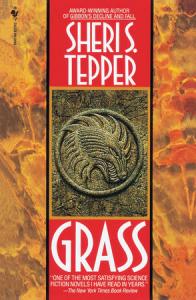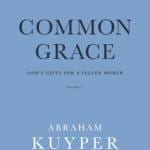On the surface, and for the first two-thirds or so of the book, Sheri Tepper’s Grass is a slow, casual stroll through the prarie in the vein of Sea of Grass (which has one of the best openings you’ll ever read in a book) or Death Comes for the Archbishop. Both of these books are also excellent, though they are not the point of this review.

Tepper’s Grass is slow science fiction clearly written by someone in love with the American West. Or maybe the Canadian West I suppose, though I would know less about that. It is the story of a planet covered in grass (in a variety of shades, so there is some diversity of setting here). The name of the planet also happens to be Grass, so that’s helpful. Life on Grass goes on as it has since time immemorial, while a plague rages through the rest of the known worlds. Why is Grass immune? What protects the quaintly archaic lives of the locals? And what might it have to do with the local “Mounts” used for “fox hunting”? What about the ancient alien ruins that exist all over the galaxy, but are especially common on Grass? And will Marjorie Westriding’s faith in God and her role in society be survive her visit to Grass?
This book has everything you’d want in a good work of science fiction–a strong female character, interesting turns: just when we think it’s about landed gentry preserving their way of life against outside interlopers, we find that their self-conception is mistaken and that there are telepathic aliens fighting each other over the survival of humanity; and reflections on tradition, gender roles, and religion all set in a unique and compelling environment.
And that really is the strength of the book. Don’t get me wrong, the reflections on religion and society are intersting and thoughtful (not that I agree on everything the book says), but the real power of this text is in the setting. The wide prairies are the place where hatred of living beings and joy in their destruction wage war with the will to survive and the desire to thrive in the face of adversity.
This is something that I wish Christians would spend more time reflecting on. I know the internet makes this a challenge (and yes, I realize the irony of saying this on the internet–so don’t bother pointing it out). Our setting matters. Our physical environment is not ultimately determinative, but it is the setting where we live out the Gospel call. And most of our go through out lives without really noticing it. Some of us live in cities, some of us in rural settings, statistically most of the people reading this blog live in suburbs or small towns. But all of us largely go through our day without thinking about the hill that we drive up on our way to work, or the moisture content of our lawns, or the architecture of the apartment building we live in. And because we don’t think about it, the power these settings have to shape us goes unnoticed and, ultimately, unchannelled, unchecked, and untempered. When we do notice, we begin to be able to respond appropriately to our settings and live better lives as a result.
And, well, I’ll not bemoan the point. We should all pay more attention to where we’re at. We should also all read Grass.
Dr. Coyle Neal is co-host of the City of Man Podcast and an Associate Professor of Political Science at Southwest Baptist University in Bolivar, MO












